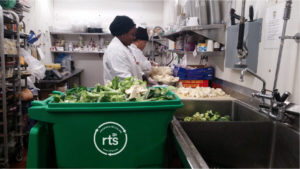Sustainable waste management is now a central tenet of any business’s sustainability goals. However, the most important thing to grasp when discussing waste management is not about the correct way, or even the best way to dispose of waste. A responsible waste management company is equally, if not more concerned, with helping you find ways to reuse, recycle, or compost your waste, as well as identify ways in which to reduce it.
They can also help you think about the raw materials that enter your supply chain upstream, providing a holistic view that seeks to reduce overall waste, save costs, and streamline operational efficiency in many small ways. In fact, thanks to advances in technology and data gathering, a more responsible, transparent, and tailored approach to waste management is now a reality.
Harnessing those technologies is central to sustainable waste management, and while dealing with business waste sustainably was once a choice, it is well on its way to becoming a legal imperative. Here then, we look at why choosing a sustainable waste management company is important for your business and what you should look out for.
The Problem of Commercial Waste
As concern over the amount of municipal solid waste (MSW) we produce as households has swelled, while the level of commercial waste generated by businesses is coming under greater scrutiny too—and for good reason. Though exact statistics are hard to pin down, research suggests that commercial waste may outstrip MSW by a ratio of 97-3, and considering that only one third of MSW (we produce 300 million tons each year) is recycled or composted in the US, the amount of commercial waste winding up in landfill is a massive challenge.
However, along with a newfound appreciation for the scale of the problem, businesses are also becoming aware of the opportunities that sustainable waste management opens up.
Why Choose a Sustainable Waste Management Company?
The most persuasive reason to work with a sustainable waste management company is also the most widely applicable across industries—it will improve operational efficiency in dozens of small ways. Every business has waste, and every business can cut some of it out.
Whether it is redirecting food waste, replacing single-use items (e.g. water bottles, disposable packaging) with multi-use alternatives, or reusing certain materials, generating even a fraction less waste means a lower cost of removal. In turn this means freeing up staff from time spent sorting and loading waste, in addition to freeing up space on site for other uses. Beyond simple operational benefits, there are plenty of other reasons to work with a waste management company oriented towards sustainability. Let’s look at the most significant ones.
Consumer Demand
Reducing waste and even striving for zero waste is a hot topic among consumers, and so it is no surprise that businesses are waking up to the positive brand associations that result from environmental sustainability.
Waste management, whilst far from the most glamorous method of touting your green credentials, is one of the most profound ways to ease your impact on the natural world. In any case, it is no longer sufficient to proclaim abstract environmental goals—an increasingly savvy public can tell the difference between greenwashing and concrete steps for change.
This reality was encapsulated in a 2019 study which found that more than half of consumers said they would pay more for sustainable products designed to be reused or recycled. In a market where real change is rewarded over the long term, a responsible waste management company will focus on making you more sustainable, not merely helping you appear so.
Investor Interest
Beyond the consumer level, investors increasingly want to see a shift in behavior to meet the challenge of climate change and broader social and environmental sustainability standards. So, while investors may not be purchasing your products and scrutinizing your online mission statements, there are now detailed ratings systems that allow investors and their proxies to assess a company’s environmental credentials.
The Dow Jones’ Sustainability Index is one such high-level categorization tool which takes stock of an organization’s total waste production, the ambition of its waste reduction targets, its approaches to recycling, and its strategies to reduce materials. This means a company may directly influence their stock price and gain accreditations like these by improving waste management systems.
Standardization and Regulation
Bolstering the sustainable stock market indices like the ones described above, there are calls for a standardized reporting system with which to assess corporate sustainability, applicable across industries. A leading light in this regard is the EU Taxonomy for standardized reporting of corporate sustainability. This EU directive gives great importance to the circular economy, of which waste management is an essential part.
Similarly, ESG investing is beginning to take off in the US, integrating and embracing social and environmental issues into existing business models and strategies, or transforming them altogether, with the underlying rationale that running a responsible business will drive better investment outcomes in the long run.
There are also already strands of legislation at the state and municipal levels enacting change in areas like the use of plastic bags in New York and mandatory commercial organics waste recycling in California. A sustainable waste management company not only helps your company comply with existing local laws, but future-proofs you against the more comprehensive measures still to come.
Employee Satisfaction
Responsibility breeds responsibility. If your employees see you making changes to the materials that come into your supply chain, they will be more likely to understand and embrace any changes to waste management systems. Your employees should be empowered in everything they do, and waste management is no exception.
When correctly facilitated, sustainable waste management involves the training and education of employees so that they can see for themselves the benefits to the business and the environment.
Because we are streamlining and even cutting out waste streams with a sustainable approach to waste management, what employees learn here will make their jobs easier, safer and cleaner. But it is still crucial to give them the time, resources and information to make the shift, rather than setting goals without pointing out the path towards achieving them.
Data Is The Future
There is a historic lack of transparency, standardization and accountability within the waste management industry. Nevertheless, responsible waste management companies are finding innovative ways to combat this. Technological advances in blockchain, radio-frequency identification (RFID) tracking, smartphone connectivity, and advanced automation allows companies like RTS to offer a clear view into where things are being taken for recycling and disposal.
This is data that can be independently validated, ensuring that the future of corporate responsibility is more than just hot air. It also plainly allows for pinpoint internal strategizing, benchmarking, and reporting. These tools will be essential in meeting future compliance measures.
Creating New Revenue Streams from Waste
Sometimes, to reduce our waste output, we need to rethink our inputs. A sustainable waste management company will help you look both up and down your supply chain. Innovations in raw materials have been particularly effective in areas such as packaging materials in e-commerce.
Many alternatives to single-use plastic and the harvesting of virgin raw materials such as trees (for paper) have emerged. The logic is that while you may spend a little more on raw materials, e.g. by replacing fossil fuel derived rubber with natural tree rubber, the reductions in waste management costs can mitigate that outlay alongside the other benefits outlined above—as well as protecting the planet of course.
However, sometimes there is waste no matter what steps we take to reduce it. A sustainable waste management company can help you to identify potential revenue streams from your own unused raw materials. One person’s trash is another person’s treasure.
One of the most common of these revenue streams is organic waste, but post-consumer paper, plastic bottles and fabrics have emerged as valuable raw materials in the manufacture of everything from makeup boxes, to note pads and new jeans.
What does Sustainable Waste Management Look Like in Practice?
So, what can you expect on a practical level when engaging a sustainable waste management company like RTS? Overhauling waste management systems can be daunting, but gaining an accurate picture is an empowering first step.
First of all you can expect a comprehensive assessment of your existing waste streams. Quantitative information must be obtained about your waste streams, followed by recommendations for change and a clear roadmap to achieving it. This measurement process includes the identification of potential new revenue streams.
We then monitor the effectiveness of your waste operations with ongoing data collection. Allowing us to draw conclusions week-to-week and month-to-month about how your business operations correlate to your waste streams. This real-time picture of your operations allows for dynamic waste management that reacts to new obstacles and evolving goals.
For example the addition of on-demand waste collections to your regular pickups can ensure there’s no disruption to operational efficiency. This third stage also includes the ongoing education of employees necessary to maintain systems and meet your goals. Crucially, we also help you use the data collected to report accurately, transparently, and to meet industry standards.
It is clearer than ever that we must not only reduce the amount of waste sent to landfill but reimagine the economy as circular, such that the producers of goods take responsibility for the life cycle of their product—from raw material to disposal.
A sustainable waste management company is not merely there to help you adapt to the external pressures of incoming legislation, growing consumer demand and stock market ratings, but to help you take advantage of potential operational efficiencies, employee satisfaction and new revenue streams to build a more robust business for the future.
We have compiled a list of the five most important online waste management resources that will help you understand compliance in your city, or just identify novel ways to reduce business waste and boost your sustainability scores. For more guidelines and information on reducing waste you can also visit our blog.








